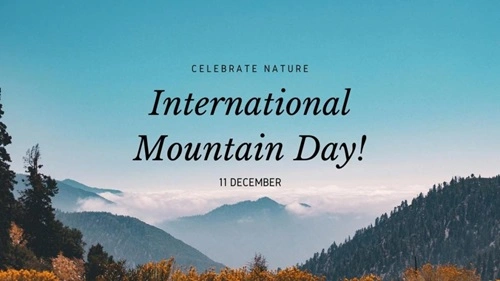International Mountain Day, observed annually on December 11, is a United Nations-designated day that celebrates the vital role mountains play in sustaining life on Earth. Mountains cover approximately 27% of the Earth’s land area and provide essential resources, including freshwater, biodiversity, and food, to millions of people. The day aims to raise awareness about the importance of mountains, the challenges they face, and the need for sustainable mountain development.
Here’s everything you need to know about International Mountain Day, its history, significance, and the global efforts to protect mountain ecosystems.
History and Origins

International Mountain Day was established by the United Nations General Assembly (UNGA) in 2003. The observance built on the success of the International Year of Mountains, declared in 2002, which focused global attention on the importance of mountains and the communities that depend on them.
December 11 was chosen as the annual date to highlight the importance of sustainable development in mountainous regions. The day is supported by the Food and Agriculture Organization of the United Nations (FAO), which coordinates activities and promotes awareness campaigns worldwide.
Significance of Mountains
Mountains are often called the “water towers” of the world because they provide 60-80% of the planet’s freshwater. Beyond water, their significance includes:
- Biodiversity Hotspots: Mountains are home to a rich variety of plant and animal species, many of which are found nowhere else on Earth.
- Livelihoods: Over 1.1 billion people live in mountain regions and depend on them for agriculture, forestry, and tourism.
- Climate Regulation: Mountain ecosystems play a crucial role in regulating climate and weather patterns.
- Cultural Heritage: Mountains have deep spiritual, cultural, and recreational significance for many communities worldwide.
The Challenges Facing Mountains
Despite their importance, mountains face numerous challenges due to human activities and climate change. These include:
1. Climate Change
Mountains are particularly vulnerable to rising temperatures. Melting glaciers, changing precipitation patterns, and extreme weather events threaten ecosystems and water resources.
2. Deforestation and Land Degradation
Unsustainable agricultural practices, logging, and infrastructure development lead to soil erosion, loss of biodiversity, and reduced water quality in mountain areas.
3. Loss of Biodiversity
As habitats are destroyed or altered, many mountain species are at risk of extinction. This loss affects ecosystem stability and local communities that depend on these resources.
4. Socioeconomic Challenges
Mountain communities often face poverty, isolation, and limited access to education, healthcare, and economic opportunities. These challenges are exacerbated by migration and urbanization.
Themes of International Mountain Day
Each year, International Mountain Day adopts a specific theme to focus on key issues affecting mountains and their communities. Recent themes include:
- 2023: “Women Move Mountains” – Highlighting the role of women in mountain conservation, development, and livelihoods.
- 2022: “Sustainable Mountain Tourism” – Emphasizing the potential of tourism to promote sustainable development in mountain regions.
- 2021: “Mountains Matter for Biodiversity” – Drawing attention to the unique and threatened biodiversity of mountain ecosystems.
These themes guide activities and campaigns aimed at raising awareness and promoting sustainable practices.
Global Efforts to Protect Mountains
The protection and sustainable development of mountain regions are supported by various international initiatives:
1. Mountain Partnership
Established in 2002, the Mountain Partnership is a global alliance dedicated to improving the lives of mountain people and protecting mountain environments. It focuses on policy advocacy, capacity building, and promoting sustainable practices.
2. United Nations Sustainable Development Goals (SDGs)
Several SDGs, including Goal 15 (Life on Land) and Goal 13 (Climate Action), emphasize the need to protect mountain ecosystems and address climate change.
3. Conservation Projects
Organizations like the World Wildlife Fund (WWF) and International Union for Conservation of Nature (IUCN) work to conserve mountain biodiversity and promote sustainable land management.
4. Community-Led Initiatives
Local communities play a vital role in preserving mountain environments through traditional practices, ecotourism, and conservation efforts.
How International Mountain Day is Observed
International Mountain Day is celebrated worldwide through various activities aimed at raising awareness and fostering action:
- Educational Campaigns: Schools, universities, and organizations host workshops, seminars, and discussions on the importance of mountains.
- Community Activities: Tree-planting drives, clean-up campaigns, and biodiversity conservation projects engage local communities.
- Cultural Events: Celebrations include music, art, and storytelling to highlight the cultural heritage of mountain regions.
- Media Campaigns: Social media and traditional media amplify the message of mountain conservation through hashtags like #MountainsMatter.
- Policy Advocacy: Governments and NGOs use the day to promote policies that support sustainable mountain development and climate action.
How You Can Contribute
You can make a difference in protecting mountains and supporting sustainable development by:
- Raising Awareness: Share information about the importance of mountains and their challenges within your community or online.
- Supporting Sustainable Tourism: Choose eco-friendly travel options that benefit local mountain communities and minimize environmental impact.
- Reducing Your Carbon Footprint: Adopt sustainable practices, such as conserving energy and reducing waste, to combat climate change.
- Participating in Local Initiatives: Join community projects focused on mountain conservation and reforestation.
- Advocating for Policy Change: Support policies and programs that protect mountain ecosystems and address climate change.
Looking Ahead: A Future for Mountains
As the world faces increasing environmental and social challenges, protecting mountains and their ecosystems is more important than ever. Sustainable development, inclusive policies, and global cooperation are essential to ensuring that mountains continue to provide vital resources and support biodiversity.
Conclusion
International Mountain Day is a powerful reminder of the critical role mountains play in sustaining life on Earth. It highlights the need to address the challenges facing these ecosystems and the communities that depend on them. By fostering awareness, supporting sustainable practices, and advocating for policy change, we can ensure a healthier, more resilient future for mountains and the planet as a whole. Let us celebrate this day by committing to protect and cherish the majestic mountains that connect us all.

